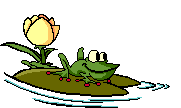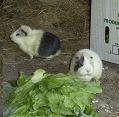 |
Bungala Ridge Permaculture Gardens REDUCE ... REUSE ... RECYCLE ... REPAIR ... RETURN ... REVEGETATE ... REPLENISH |
||||||||
|
|||||||||
|
|
Permaculture Diary: In the Summer Garden Copyright © Beverley Paine January 2002 By now most of my summer living mulches are well established. In the vegetable garden strawberries, oregano and nasturtiums ramble between tall flowering silverbeet and leeks. All are setting seed. I usually let the seed fall and sprout. It's amazing where new plants pop up. The silverbeet 'trees' are abundant in the garden and are used as food for the guinea pigs once the weeds around the house have been harvested. It's hard to keep a tidy garden as we let the weeds grow tall, knowing that they are usually the only green thing in the garden come March. Feeding the guinea pigs becomes a satisfying task, as the garden gradually looks more respectable! The rock mulch around most of the trees in the orchard is still intact and doesn't need topping up. A few years we began placing hand-sized rocks around the base of the trees, in a radius of about a metre. Although the grass continues to grow through the rocks, the mulch provides cover from the scorching sun and stops our free ranging chickens from scratching around the base of the tree. The rocks are too heavy for the chickens to scatter, unlike other mulches we've used. The idea appears to be working because we're in the middle of harvesting out best fruit crop yet. Early in Spring we invested in a trailer of spoiled pea straw from Yankalilla Landscape Supplies. We stored the straw in the guinea pig and pigeon cage, to add fertiliser. Once the soil in the vegetable beds began drying out we added handfuls around the plants. This, and the mild weather, eventuated in bumper growth, a real boost to my gardening confidence. Our aim is to revegetate two of our four acres with local native plants. New plants are placed along a drip irrigation line and protected by wire mesh guards. We irrigate for two or three years then recycle the drip line for new plantings. With the tall trees well established, we're planting small shrubs, groundcovers and grasses. We've noticed that introduced grasses and weeds have gradually disappeared as the native species take over. At the moment, we are watering twice a week, with spot watering in between if needed. This keeps the volume of fruit and vegetables coming. I've found that hand watering in the vegetable garden is best. This allows me to monitor what's ready for eating and what needs attention. I seem to be using much less water, as I'm watering specific plants, rather than the whole vegie plot. I usually give up gardening by late January, disappointed by the dry, dusty soil and scorched plants. I'm hoping the mild start to the year and my new mulching practices will continue to foster my gardening enthusiasm throughout summer.
|
Hot Links!
This site is sponsored by |
|||||||
|
|
|
|
|||||||




